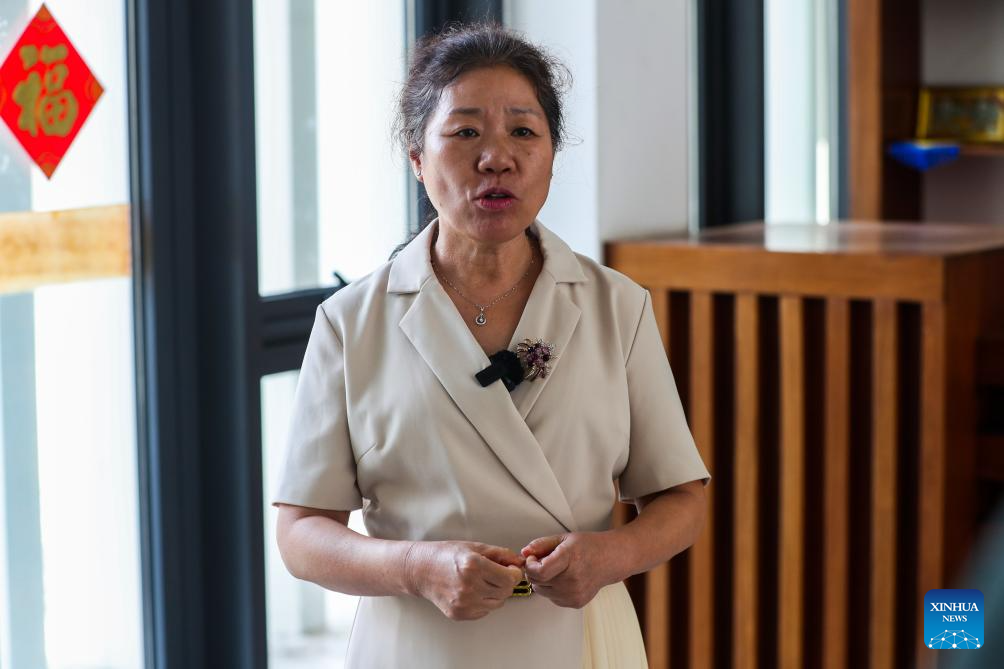
Zhang Xiaozhen, Chinese director of the Confucius Institute at the University of Dar es Salaam, is interviewed in Dar es Salaam, Tanzania, on July 4, 2025. (Xinhua/Emmanuel Herman)
DAR ES SALAAM, July 7 (Xinhua) -- On a quiet morning, inside a sunlit classroom at the Confucius Institute at the University of Dar es Salaam, a group of Chinese teachers was reciting Kiswahili greetings.
"Habari za asubuhi," one said, smiling. "Nzuri sana," responded another. This simple exchange, "good morning" and "very good," is more than just a language lesson.
It represents a growing movement of cultural curiosity, mutual respect, and educational exchange between China and Tanzania.
As the international community marked World Kiswahili Language Day on Monday, the spirit of this day came vividly alive at the Confucius Institute of Tanzania's largest university, where Chinese nationals were embracing Kiswahili not just as a language but as a gateway to understanding local life.
Kiswahili, also known as Swahili language, is one of Africa's most widely spoken languages, serving as a lingua franca across East and Central Africa.
The General Conference of the United Nations Educational, Scientific and Cultural Organization (UNESCO), at its 41st session held in Paris, France, in 2021, proclaimed July 7 of each year as World Kiswahili Language Day, making it the first African language to be recognized in such a manner by the UN.
Yang Xin, a Chinese language teacher at the Confucius Institute, said learning Kiswahili has been both a challenge and a necessity.
"At first, I couldn't understand anything," she recalled. "But thanks to the Confucius Institute, I started learning. It helps me adapt to life here and connect with people."
Zou Zhenzhen, another Chinese teacher, echoed that sentiment. "Even using just a few Kiswahili words in class makes a difference. It shows students we respect their culture, and it makes them more excited to learn Chinese. You can see it on their faces."
Their approach is simple yet effective: to ask for help, practice outside of class, and apply what you've learned when shopping, riding taxis, or simply chatting with colleagues.
"Now I can order food, talk to a taxi driver, and even joke with friends. Language breaks the ice," Zou beamed with a smile. Both Chinese teachers have been learning Kiswahili for the past two months, attending two two-hour sessions on Sundays.
The impact of Kiswahili fluency goes beyond the classroom.
According to Emmanuel Legonga, a local Tanzanian Chinese language teacher at the Confucius Institute, who also teaches Kiswahili to overseas Chinese in Tanzania, speaking the local language has practical ripple effects across industries.
"In infrastructure projects like railways and ports, when Chinese managers or engineers use Kiswahili, it builds trust with local workers," Legonga explained. "It removes the sense of distance. Workers feel seen, respected."
This is especially important in the Belt and Road Initiative (BRI) projects, where large-scale collaboration between Chinese and Tanzanian professionals is vital. "Language opens the door to transparency. It reduces misunderstandings and builds confidence," he added.
Legonga was elated when he revealed that one of his Kiswahili students is Zhang Xiaozhen, Chinese director of the Confucius Institute at the University of Dar es Salaam.
In Zhang's eyes, interest in Kiswahili among Chinese nationals is steadily rising.
"In our last session, over 70 Chinese joined Kiswahili classes. This year, nearly 90 are enrolled," she noted. "Some start learning in China, others after they arrive. About 20 Chinese teachers have studied Kiswahili."
Zhang herself studies Kiswahili whenever her schedule allows. "Language is a bridge. It connects people. And Kiswahili is becoming more important, not just in East Africa but globally," she said.
Zhang has identified strong cultural parallels between China and Tanzania. "Tanzania's concept of Ujamaa, cooperation, and community echoes China's collectivist values. In both cultures, family and harmony are central," she remarked.
As Mussa Hans, Tanzanian director of the Confucius Institute, prepared to commemorate this year's World Kiswahili Language Day, he reflected on the institute's broader mission.
"We don't just teach language; we build relationships," he said. "We promote both Chinese and Kiswahili so that our people can understand each other better."
The vision is simple but profound: a future where the Chinese director speaks fluent Kiswahili and the Tanzanian director speaks Chinese.
"There should be no language barrier between our countries," he said. "Whether you are going from China to Tanzania or vice versa, learn Kiswahili, learn Chinese." ■

Chinese students attend a Kiswahili language class at the Confucius Institute at the University of Dar es Salaam in Dar es Salaam, Tanzania, on July 4, 2025. (Xinhua/Emmanuel Herman)

Emmanuel Legonga (2nd R), a Tanzanian Chinese language teacher at the Confucius Institute at the University of Dar es Salaam, helps Chinese students study Kiswahili in Dar es Salaam, Tanzania, on July 4, 2025. (Xinhua/Emmanuel Herman)

Mussa Hans, Tanzanian director of the Confucius Institute at the University of Dar es Salaam, is interviewed in Dar es Salaam, Tanzania, on July 4, 2025. (Xinhua/Emmanuel Herman)
